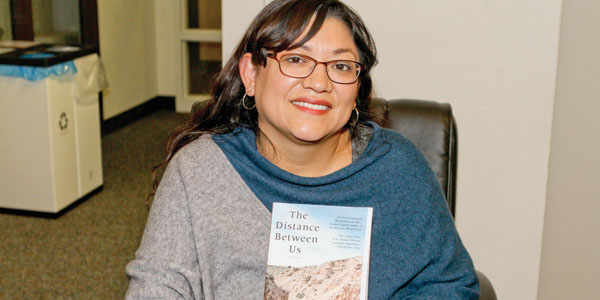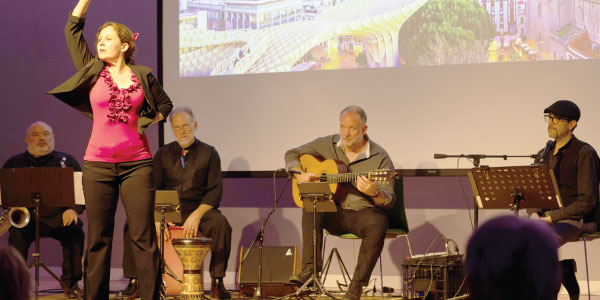
Having entered the United States as an undocumented immigrant, Los Angeles-based novelist and memoirist Reyna Grande is familiar with national discussions over immigration-related issues – and how those discussions can be dehumanizing.
About 10 years ago, Grande decided she wanted “to create a different kind of conversation around immigration.”
Grande created that conversation by writing “The Distance Between Us.” Published in 2012 by Washington Square Press, the memoir describes how she and her family left her native Mexico for the United States – and the challenges that came with illegally crossing the border. She provided some background on the book during an Oct. 18 lecture at Avila University, where she appeared as part of the Harry S. Truman Distinguished Lecture Series.
“I had grown very tired of the way politicians talk about immigrants … – talking about us in terms of statistics, talking about us in terms of the … economic side of immigration or the legal side of immigration,” she told the audience in Avila’s Goppert Theater.
By discussing immigrants in those ways, politicians were failing to see immigrants as human beings, Grande said. To help present immigrants with a sense of humanity, Grande opted to write what she called “a deeply personal book.” That meant avoiding immigration-related statistics.
“I also wanted to write from a child’s perspective,” said Grande, who entered the country in 1985 at age 9. “Because as a child immigrant, coming here to this country, I struggled a lot, … in a different way than my parents struggled.”
In addition, Grande said she wanted to include the perspectives and memories of other family members, particularly her siblings. By doing so, Grande learned about her brother Carlos. She had “never paid attention to him” while they were growing up because “he was a boy,” she admitted, drawing some laughs from the crowd. She recalled her effort to make her brother a fully developed character in her book by taking him aside and asking him to share his recollections of leaving Mexico for the United States.
“That was such a beautiful moment for me, because then, I was able to see my journey through his eyes, too,” she said.
Other topics Grande addressed during her lecture and ensuing question-and-answer session included how her work has influenced her readers. Some of her readers are immigrants who tell her that her memoir gave them a sense of validation and a sense of belonging, she said.
“That’s such a beautiful thing for me to hear from other immigrants,” Grande stated. “Because I remember as a child not having a book that spoke to me that way.”
Reyna Grande comparte su búsqueda para humanizar la experiencia de los inmigrantes con la audiencia de Ávila
Habiendo ingresado a los Estados Unidos como inmigrante indocumentada, la novelista y escritora autobiográfica que radica en Los Ángeles, Reyna Grande, está familiarizada con las discusiones nacionales sobre temas relacionados con la inmigración y cómo esas conversaciones pueden ser deshumanizantes.
Hace unos 10 años, Grande decidió que quería “crear un tipo de conversación diferente sobre la inmigración”.
Ella empezó esa conversación escribiendo “La distancia entre nosotros”. Publicada en 2012 por Washington Square Press, la autobiografía describe cómo ella y su familia dejaron su México natal por Estados Unidos y los desafíos que surgieron al cruzar ilegalmente la frontera. Proporcionó algunos detalles sobre el libro durante una conferencia el 18 de octubre en la Universidad de Ávila, donde apareció como parte de la serie de conferencias destacadas de Harry S. Truman.
“Estaba cansada de la forma en que los políticos hablan de los inmigrantes … hablando de nosotros en términos estadísticos, hablando de nosotros en términos del lado económico o el lado legal de la inmigración”, indicó a la audiencia en el teatro Goppert en Ávila.
Al hablar sobre los inmigrantes de esa manera, los políticos no veían a los inmigrantes como seres humanos, dijo Grande. Para ayudar a los inmigrantes con un sentido de humanidad, ella optó por escribir lo que ella llamó “un libro profundamente personal”. Eso significaba evitar las estadísticas relacionadas con la inmigración.
“También quería escribir desde la perspectiva de una niña”, menciono Grande, quien ingresó al país en 1985 a los 9 años. “Porque como una niña inmigrante, viniendo aquí a este país, tuve muchos problemas … de una manera diferente a la mía mis padres también los tuvieron”.
Además, Grande dijo que quería incluir las perspectivas y recuerdos de otros miembros de su familia, especialmente la de sus hermanos. Al hacerlo, ella se enteró de su hermano Carlos. Ella admitió que “nunca le había prestado atención” mientras crecían porque “era un niño,” provocando algunas risas entre la multitud. Pero recordó su esfuerzo por hacer de su hermano un personaje desarrollado totalmente en su libro, habló con el aparte y le pidió que compartiera sus recuerdos de dejar México por Estados Unidos.
“Fue un momento tan hermoso para mí, porque entonces, pude ver mi viaje a través de sus ojos,” mencionó.
Dentro de otros temas tratados por Grande durante su conferencia y la sesión de preguntas y respuestas estuvieron cómo su trabajo ha influido en sus lectores. Algunos de sus lectores son inmigrantes que le dicen que sus memorias les dieron un sentido de validación y pertenencia, indicó.
“Es algo muy hermoso para mí escuchar de otros inmigrantes”, declaró Grande. “Porque recuerdo que cuando era niña no tenía un libro que me hablara de esa manera.









